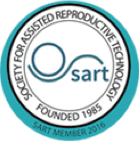When you and your provider have decided that utilizing donor eggs is the best route to achieving your family goals, there are several different ways you can get started.
You can choose from the Carolinas Fertility Institute (CFI) egg donor bank or an outside egg donor agency for fresh and frozen donor cycles. There are two agencies, Giving Hope and The Donor Source, that we work with frequently. With a fresh donor cycle, you can either do a shared cycle or an individual cycle. When you contact CFI, our Third Party Program Coordinators will go into greater detail.
Tasks
While you are looking for a donor or once a donor is selected, you will need to have a saline sonogram, trial transfer, and endometrial biopsy.
- Saline sonogram: This is a special ultrasound where water is injected into the uterine cavity through a small catheter. This water separates the walls of the cavity and allows the provider to detect any problems that may impact the chances of a successful embryo transfer.
- Trial Transfer: This is a practice run for an embryo transfer. A thin catheter is advanced into the uterine cavity as will be done at the time of the embryo transfer. The trial transfer allows the provider to assess if any special considerations need to be made at the time of the true embryo transfer.
- Endometrial biopsy/ endometrial scratch: A small catheter is advanced into the uterine cavity and a small amount of tissue is recovered and sent for review by a pathologist. In some cases, the result of the biopsy indicates to the provider that antibiotics are recommended as a part of an appropriate treatment strategy. At the time of the biopsy, the endometrium is also disrupted, a process that has been shown in some studies to increase pregnancy rates with embryo transfer.
Additional Considerations
- As the recipient of donor eggs, if you are 43 years old or older, you will need to have a Maternal Fetal Medicine (MFM) consult. If you are 45 and older, you will need a Maternal Fetal Medicine consult, an up-to-date mammogram, and a cardiac stress test before proceeding with embryo transfer.
- After the selection of a donor is made, we will work with you to coordinate either a fresh or frozen embryo transfer. The type of transfer depends on your ideal timing for transfer, if you are choosing PGT-A testing on your embryos, and/or the best medical circumstance based on your endometrial biopsy results.
For frozen donor eggs, CFI has a frozen egg bank for intended parents to view. In addition, CFI frequently works with My Egg Bank, Fairfax Egg Bank, and Donor Egg Bank of America to offer frozen eggs for transfer and use at CFI. For this type of cycle, you will receive 5-7 eggs to be fertilized with sperm and grow to reach blastocyst stage (grow for about 5-6 days). They will then either be used for transfer or for freezing.
Depending on the type of donor cycle you choose, your embryo will be transferred 5-6 days after they are fertilized. If genetic testing on the embryo is performed, the embryo will be frozen after the biopsy and the results will typically return in 10-14 days. If you are utilizing a frozen donor cycle, the agency you receive the frozen eggs from may recommend not performing genetic testing on the embryo created (due to the age of donor), however, this can be performed if you choose to do so.
To prepare you for your embryo transfer, you will be started on estrogen and progesterone medication. This will help grow your uterine lining and create an optimal environment for a successful pregnancy. On the day of the embryo transfer, you will arrive at the Winston-Salem office with a full bladder. You are awake during the transfer, and it is a relatively painless procedure where one embryo is placed in the endometrial cavity. Your partner can be in the room with you during the procedure.
Eight days after the embryo transfer, you will come to your closest CFI office for a blood pregnancy test. If positive, you will return two days later for a repeat hCG. If the values look good, we will then have you come back in two weeks for your first ultrasound. We will typically follow the pregnancy until eight or nine weeks before releasing you to your OB/GYN.
For more information, please contact the Egg Donor Team using our Artisan Patient Portal.




